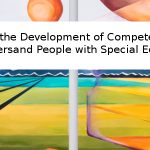Conference

INTERNATIONAL SCIENTIFIC CONFERENCE
disseminating the project
Laboratories of innovation in the development of competence of teachers of special educationand people with special educational needs
After the conference…
We would like to thank all participants and speakers for taking part in the conference meeting. At the same time, we invite you to familiarize with the conference materials.
Conference report
On the sunny Friday, 19 May 2017 at the Maria Grzegorzewska University in Warsaw, an international scientific conference was held to disseminate the results of the project Innovation Laboratories in the Development of Competencies of Teachers of special Education and People with Special Educational Needs. During the meeting we outlined the main assumptions of our project and shared the passion and experience of i-Labs’ implementation in partner institutions.
The conference was opened by the Rector of the Maria Grzegorzewska University, prof. Stefan Kwiatkowski, and the host of the project was Mariusz Fila. About 120 people took part in the event, including a dozen of foreign visitors from Italy, Germany, the Czech Republic, Spain and the UK.
The basic assumptions of the project were introduced by the Project Manager Mariusz Fila. He presented the main objectives and actions taken in reference to various aspects. He familiarized participants of the conference with project partners pointing to their roles and tasks. He also referred to the results obtained during the nearly two and a half year project.
Jolanta Religa from the Institute of Exploitation Technology at the State Research Institute in Radom introduced us as the origin of the i-Labs and presented their potential in the development of competencies not only of teachers of special education or those with special educational needs, but also of other professional groups. She referred to the experience of the first i-Lab gained in the UK and the inspiration it gave.
The partners from the German CDJ Maximiliansau presented their experiences of implementation of the innovation laboratory for people with disabilities in vocational education, which is consistent with the idea and the CDJ’s vision of building an inclusive society.
Musa Kirkar, introduced with charisma the potential of ICT innovation in non-governmental organizations working for people with special needs. Referring to the experience of Italy, he explained the opportunities that i-Lab provides in his day-to-day work.
In the i-Lab methodology, its psychological aspects cannot be ignored as our Czech partners Jan Šmahaj and Martin Zielina lean forward in their speeches. They mentioned the importance of proper i-Lab equipment, gadgets, and the possibilities afforded by the arrangement of space in the context of the learning environment.
Katarzyna Kruś and Monika Radomska presented the use of i-Lab in special education. In their speech, they recalled their experience gained while working in i-Lab with special education teachers who will work with people with disabilities in the future.
Due to health reasons Adamina Korwin-Szymanowska did not come to the conference to present the possibilities of using i-Lab in the environmental education. However, in her speech she wanted to focused on a paradigm shifted from teaching to learning which largely depends on the development of educational situations. This change is proposed by i-Lab, which can become a place for both personal and social development with regard to nature as a tool for a holistic growth of the individual.
Finally, the Project Manager Mariusz Fila, presented the results of research on organizational and educational needs of special educators, who set out a further path to support their development.
During the conference there was an artistic part made by the vocal group “Pause … One, Two, Three” from the special school no. 101 in Warsaw. Young artists with their music and singing introduced us into the world of Jan Twardowski poetry.
The debate conducted by Sergo Kuruliszwili successfully summarized the whole idea of the conference. All project partners participated in it. The Polish and Czechs shared their experiences on the difficulties they had while implementing i-Lab in their institutions. They talked about what was easy to achieve and what was the most difficult in the new method. The Germans and Italians expressed their opinion on i-Lab as a tool for working with people with special educational needs. In addition, with regard to Polish and German reflections, an attempt was made to determine the place and role of i-Lab in vocational education. The psychological aspects of the implementation of i-Lab were presented by our Czech partners. In the end, the i-Lab’s usefulness as a learning environment regardless of its location (school, work, NGOs, universities) was considered.
After a fruitful debate and numerous questions from the participants of the event, the Project Manager officially ended the conference, wishing all many inspirations with and in i-Lab. This is the way how the extraordinary and long awaited event ended.
Thank you for being there with us!
Photo Galery















































































































 Project implement in "Erasmus +" program.
Action KA2 - Cooperation for Innovation and the exchange of good practices,
Strategic Partnership for vocational and education training
Project implement in "Erasmus +" program.
Action KA2 - Cooperation for Innovation and the exchange of good practices,
Strategic Partnership for vocational and education training